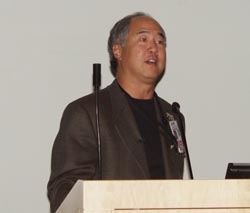Alumnus Details American Red Cross Katrina Effort
 Every day American Red Cross volunteers freely give their time and effort to carrying out the commitment of the nonprofit organization: the alleviation of human suffering. When Hurricane Katrina hit the Gulf Coast in August, the destructive strength of this storm tested the fortitude of victims and relief workers alike, including Northwestern alumnus Young Chung, MD ’86.
Every day American Red Cross volunteers freely give their time and effort to carrying out the commitment of the nonprofit organization: the alleviation of human suffering. When Hurricane Katrina hit the Gulf Coast in August, the destructive strength of this storm tested the fortitude of victims and relief workers alike, including Northwestern alumnus Young Chung, MD ’86.
A volunteer with the Red Cross’ Disaster Health Services (DHS) and Disaster Action Team since 2002, Dr. Chung served as co-senior manager of DHS for Mississippi, Alabama, and northern Florida during the first two weeks after Hurricane Katrina made second landfall. Overseeing DHS personnel in those three states from Disaster Relief Operations headquarters in Montgomery, Alabama, he allocated human resources, managed the training of health services volunteers, and worked with a team of epidemiologists to determine and control any secondary public health threats.
Dr. Chung described his experience and the Red Cross response at a lecture, “Global Health: Environmental Disasters—Hurricane Katrina and the America Red Cross”, at the Feinberg School on October 27.
Many factors complicated and hampered Red Cross and other relief efforts in the days immediately following Hurricane Katrina, according to Dr. Chung. “To date Hurricane Katrina is this country’s largest natural disaster,” says this Chicago-area neurosurgeon. “There was a large number of evacuees, prolonged loss of communication, and many affected states, which overwhelmed relief services. In the greater Chicago area alone, we served about 7,000 clients.”
On September 2 the Red Cross was operating 148 shelters and housing more than 17,000 people in the three states covered by Dr. Chung. Adding stats from six surrounding states, the tally totaled 284 shelters with 94,000 sheltered. Remarks Dr. Chung, “By the next day, these numbers grew to 356 shelters and 107,000 sheltered.”
DHS relies on health care volunteers to administer first aid, refer victims to other agencies, monitor the health of relief workers, and collect public health data for the Centers for Disease Control and Prevention. During the first few days after Hurricane Katrina, DHS volunteers worked around the clock treating a wide variety of ailments from lacerations and abrasions to fire ant and snake bites. Lost medications, unknown prescriptions, and broken supply lines made refilling pharmacy orders difficult as local hospitals and other dispensaries were in disarray. Remarks Dr. Chung, “Hospital pharmacies were often flooded because so many are located on first floors.”
In Red Cross shelters, downed phone lines and spotty cell phone coverage limited communication with the outside world. Dr. Chung could only use his satellite phone to call another similar phone, but both callers needed to be outdoors for the calls to go through. DHS volunteers used ham radios for emergency communications. Since they could not send confidential health information over radio frequencies, Red Cross staff would often contact shelter volunteers to inform them of a site where cell phones might be working so private information could be communicated. Handling medical emergencies required ingenuity and a bit of luck in the early days of the disaster.
“Normally in the case of a heart attack, we would call 911,” says Dr. Chung. “The problem was there was either no 911 or the means to get 911 assistance was obstructed. Local hospitals were overburdened or destroyed, and EMS were severely compromised.”
Formerly in private practice in the Elgin-Barrington area, Dr. Chung volunteers for the Red Cross’ DHS for Greater Chicago as well as covers national disasters such as fires, floods, and hurricanes. The Red Cross has deployed him to assist with flooding relief efforts in West Virginia in 2003 and in Nebraska this past year. He also provided support for victims of the Florida hurricanes in 2004. Hurricane Katrina, however, presented a unique challenge for all involved.
“Compared with the Florida hurricanes, Katrina had problems due to its widespread nature,” explains Dr. Chung. “There were longer delays in replacement medications, harsher conditions for longer periods of time, and decreased access to public and private health services related to lost infrastructure—roads, buildings, supplies—and the direct affect of disaster on personnel.”






